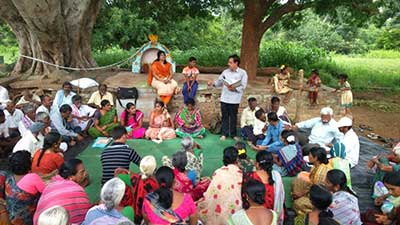Date: 19/10/2022
Relevance: GS-2: Issues and challenges pertaining to the federal structure, devolution of powers, and finances up to local levels and challenges therein.
Key Phrases: Agents Of Higher-Level Governments, Champions Of Decentralization In Politics, Democratic Decentralisation, Postponement Of Elections, Market Chain Of Corruption, Revitalization Of Gram Sabhas And Ward Committees In Urban Areas
Context:
- The 73rd and 74th constitutional amendments devolved a range of powers and responsibilities to panchayats and municipalities and made them accountable to the people for their implementation, however, even after 30 years, very little actual progress has been made in this direction.
Key Highlights:
- Democracy has not been enhanced in spite of about 32 lakh people’s representatives being elected to them every five years, with great expectations from the people.
- Local governments remain hamstrung and ineffective and act as mere agents of higher-level governments.
What is devolution?
- The Constitution mandates that panchayats and municipalities shall be elected every five years and mandates the states to devolve functions and responsibilities to them through law.
- Devolution, envisioned by the Constitution, is not mere delegation.
- It implies that precisely defined governance functions are formally assigned by law to local governments, backed by an adequate transfer of financial grants and tax collection authority, and they are given staff so that they have the capacity to carry out their responsibilities.
- Above all, local governments should report primarily to their voters, and not to higher-level departments.
Key issues with the decentralisation of governance:
- Issue of funds:
- Inadequate volume of money is set apart for the local governments to meet their basic requirements.
- There is no flexibility over the use of funds granted and even in the case of untied grants mandated by the Union and State Finance Commissions, their use is constrained through the imposition of several conditions.
- Issue of functionaries:
- Local governments do not have adequate staff to perform even basic tasks.
- Furthermore, as most staff members are hired by higher level departments and placed with local governments on deputation, they do not feel responsible to the latter and they function as part of a vertically integrated departmental system.
- Lack of capacity building:
- There is little investment in enabling and strengthening local governments to raise their own taxes and user charges.
- Postponement of elections:
- States have often postponed the elections in violation of the constitutional mandate of five-yearly elections to local governments.
- In 2005, when the Gujarat government postponed the Ahmedabad corporation elections, a Supreme Court constitutional bench held that under no circumstances can such postponements be allowed.
- Yet, in Tamil Nadu, panchayat elections have not been held for over two years, resulting in the State losing finance commission grants from the Union government.
Issues with centralisation of governance:
- The current Union government has centralised the service delivery mechanism by using technology, and panchayats are nothing more than front offices for several Union government programmes.
- The ‘Smart City’ programme does not devolve its funds to the municipalities and the states have been forced to constitute ‘special purpose vehicles’ to ring fence these grants.
- People do not distinguish the level of government that is tasked with the responsibility of delivering local services except for a few champions of decentralization in politics and civil society.
Issue of Corruption by local governments:
- A market chain of corruption operates involving a partnership between elected representatives at the local level and officials at all levels.
- Criminal elements and contractors are attracted to local government elections, tempted by the large sums of money now flowing to them and they win elections by bribing voters and striking deals with different groups.
Way ahead:
- Revitalization of gram sabhas and ward committees in urban areas:
- Cosmetic reforms of the gram sabha by regulating gram sabha meetings and videography of these meetings, does little for democracy.
- Consultations with the gram sabha can be organized through smaller discussions where everybody can participate.
- Even new systems of Short Message Services or social media groups could be used for facilitating discussions between members of the gram sabha.
- Strengthening of local government organizational structures:
- Panchayats are burdened with a huge amount of work that other departments thrust on them, without being compensated for the extra administrative costs.
- Local governments must be enabled to hold State departments accountable and to provide quality, corruption-free service to them, through service-level agreements.
- Local taxation:
- Local governments are reluctant to collect property taxes and user charges fully.
- They are happy to implement top-down programmes because they are aware that if they collect taxes, their voters will never forgive them for misusing their funds.
- The connection between tax payment and higher accountability is well known but these lessons are highly ignored.
Conclusion:
- India’s efforts in decentralisation represent one of the largest experiments in deepening democracy.
- Decentralisation is always a messy form of democracy, but it is far better than the criminal politicians operating at the higher level who appropriate huge sums of tax-payer money without leaving any clue to the public.
- Local government representatives can be kept on track which is not possible in the case of politics at the higher level.
- The country has a reasonably robust democratic structure for local governance and it is for the people to give life to this structure through the practice of a robust democratic culture.
- It is time that the local people set the accountability of the local governments.
Source: The Hindu
Mains Question:
Q. The 73rd and 74th constitutional amendments devolved a range of powers and responsibilities to panchayats and municipalities and made them accountable to the people for their implementation, however, even after 30 years, very little actual progress has been made in this direction. Analyse. (250 words).






















